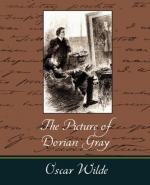“I should think it was, Harry. But according to your category I must be merely an acquaintance.”
“My dear old Basil, you are much more than an acquaintance.”
“And much less than a friend. A sort of brother, I suppose?”
“Oh, brothers! I don’t care for brothers. My elder brother won’t die, and my younger brothers seem never to do anything else.”
“Harry!” exclaimed Hallward, frowning.
“My dear fellow, I am not quite serious. But I can’t help detesting my relations. I suppose it comes from the fact that none of us can stand other people having the same faults as ourselves. I quite sympathize with the rage of the English democracy against what they call the vices of the upper orders. The masses feel that drunkenness, stupidity, and immorality should be their own special property, and that if any one of us makes an ass of himself, he is poaching on their preserves. When poor Southwark got into the divorce court, their indignation was quite magnificent. And yet I don’t suppose that ten per cent of the proletariat live correctly.”
“I don’t agree with a single word that you have said, and, what is more, Harry, I feel sure you don’t either.”
Lord Henry stroked his pointed brown beard and tapped the toe of his patent-leather boot with a tasselled ebony cane. “How English you are Basil! That is the second time you have made that observation. If one puts forward an idea to a true Englishman—always a rash thing to do—he never dreams of considering whether the idea is right or wrong. The only thing he considers of any importance is whether one believes it oneself. Now, the value of an idea has nothing whatsoever to do with the sincerity of the man who expresses it. Indeed, the probabilities are that the more insincere the man is, the more purely intellectual will the idea be, as in that case it will not be coloured by either his wants, his desires, or his prejudices. However, I don’t propose to discuss politics, sociology, or metaphysics with you. I like persons better than principles, and I like persons with no principles better than anything else in the world. Tell me more about Mr. Dorian Gray. How often do you see him?”
“Every day. I couldn’t be happy if I didn’t see him every day. He is absolutely necessary to me.”
“How extraordinary! I thought you would never care for anything but your art.”
“He is all my art to me now,” said the painter gravely. “I sometimes think, Harry, that there are only two eras of any importance in the world’s history. The first is the appearance of a new medium for art, and the second is the appearance of a new personality for art also. What the invention of oil-painting was to the Venetians, the face of Antinous was to late Greek sculpture, and the face of Dorian Gray will some day be to me. It is not merely that I paint from him, draw from him, sketch from him. Of course, I have done all that. But




